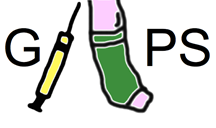
When a person is in hospital for an operation, they often spend a lot of time in bed, putting them at risk of deep vein thrombosis (DVT). DVT is where a blood clot develops in a deep vein in one or both of the legs, causing pain, swelling and long term complications such as leg ulcers. If a DVT is not treated, then there is a risk that part of the blood clot could break off and become stuck in one of the lungs, blocking blood supply (pulmonary embolism, PE). Together, these two conditions are known as venous thromboembolism (VTE), which is a leading cause of death and disability worldwide. The importance to preventing patients from developing VTE is widely recognised. The main strategies in place involve anticoagulant medications (which thin the blood so it cannot form the harmful clots) and mechanical devices such as elasticated compression stockings (which apply continuous pressure to the legs, helping to maintain blood flow). Evidence for using elastic stockings to prevent VTE has been challenged, with a lack of evidence for the additional benefits of elastic stockings over and above the benefit of blood-thinning. If elastic stockings reduce VTE over and above blood thinners, these benefits need to be weighed against the disadvantages, such as discomfort, restricting blood flow to the leg, blistering, cost and staff needing to help patients to put them on.
The GAPS study, funded by NIHR HTA Programme, aimed to compare whether patients who wear elastic stockings, as well as taking anticoagulant medication have a lower chance of developing VTE than patients who take anticoagulant medications only. Participants were randomly allocated to one of two groups: 1) Graduated compression to wear during their hospital stay, as well as taking low molecular weight heparin OR 2) low molecular weight heparin only.
The primary outcome was new VTE within 90 days of surgery. One thousand, eight hundred and fifty-eight adult elective surgical inpatients were randomised and included in the analysis. In the group randomised to wear graduated compression stockings and take low molecular weight heparin, 1.4% had a VTE compared to 1.7% of those in the low molecular weight heparin only group. In this non-inferiority trial, low molecular weight heparin was confirmed to be non-inferior. These findings suggest that graduated compression stockings may be unnecessary in most patients undergoing elective surgery.
The study was led by Professor Alun Davies based at Imperial College London.
Contacts
- CHaRT email; chart@abdn.ac.uk
Status
CompletedPublications
The protocol was published in the European Journal of Vascular and Endovascular Surgery https://www.sciencedirect.com/science/article/pii/S1078588417301247?via%3Dihub
The results were published in the BMJ https://www.bmj.com/content/369/bmj.m1309
The detailed report on the study is available in Health Technology Assessment https://www.journalslibrary.nihr.ac.uk/hta/hta24690/#/full-report
